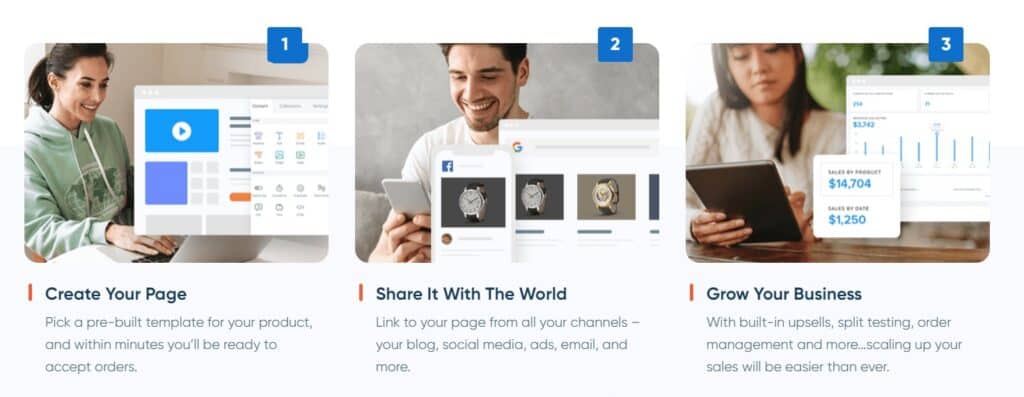SamCart vs. Shopify: Which One Should You Use?
The success of your online business takes more than just a great product. You also need a platform that can help you get your desired results. The question, however, is: Which platform should you use?
To narrow it down, you should look for e-commerce-based apps. These contain features relevant to the field. Some apps even offer all-around functions for full potential.
For today, we’ll focus on SamCart vs. Shopify. These are two of the most used e-commerce platforms. This makes them ideal candidates for start-ups. We’ll talk about their features, pros and cons, and who will most benefit from them.
Contents
What is SamCart?
The first app that we will talk about is SamCart. Its founder, Brian Moran, is one of the top online entrepreneurs of all time. He took his experiences in the field to curate the said app. He, along with his team, launched SamCart in 2014.
In a nutshell, SamCart’s goal is to help businesses get the most profit and conversions. They aim to do this while still making it easy for the users. Through this, you can make your own website, design it, and integrate all the functions that you need. This, however, focuses on aiding in digital products.
The application is available in 3 plans. These are Launch, Grow, and Scale. They cost $49, $99, and $199 per month, respectively. This is also available in a 14-day free trial.
What is Shopify?
Moving on, we have Shopify. This is as popular as the former app, if not more. Tobias Lutke, Scott Lake, and Daniel Weinand founded this in 2006. Initially, this started as an online store selling snowboard gear. Over time, the founders decided to make it a software-as-a-service (SaaS) app.
Similarly, Shopify helps in growing online businesses through a set of certain features. This app’s goal is to assist retail stores with growing towards being an online business. You can also do almost everything through this. This mostly caters to those selling physical products.
Again, you have 3 packages to choose from. Namely, these are Basic Shopify, Shopify, and Advanced Shopify. The prices come up to $29, $79, and $299 monthly, respectively. You can also avail of a 14-day free trial before buying a plan.
SamCart Features
SamCart has quite a number of e-commerce features that will benefit your store. It covers site building, checkout processing, integrations, optimization, and core needs. See below for a brief overview:
- Drag-and-Drop Builder
- Ready-to-Use Templates
- Localization
- Custom Domains
- One-Touch Pay
- Order Bumps
- One-Click Upsells
- A/B Testing
- Smart Pixel Tracking
- Advanced Reporting
- Affiliate Center
- Cart Abandonment
- Payment Processors
- Customer Portal
There are much more functions that you can access once you use the app. As you can see, you are pretty much all set to sell to the public. The Localization feature will also make it easier to go international. What makes it better is that you can add unlimited products without having to pay extra.
Shopify Features
Moving on, Shopify’s features are not that distant from SamCart’s. The difference is that this offers more than site builder, shopping cart, and metrics. This will also allow you to manage your marketing strategies.
You can also expect web hosting. Here are some of the functions that you should know:
- HTML Website Builder
- Pre-Made Templates
- Custom Domain
- Blog Feature
- Abandoned Cart Recovery
- Automatic Tax Calculation
- Calculated Shipping Rates
- Payment Gateways
- Email Templates
- Social Media Integration
- Order Fulfillment
- Traffic Reports
The app is famous for having a responsive mobile app. You can download it on your mobile device for easier access to your store. This also comes with a free SSL Certificate. Along with this, it will provide unlimited bandwidth and products.
Pros and Cons of SamCart
Of course, there are always two sides to every platform.
First, let us discuss the pros of SamCart:
- Offers Affiliate Center
Opening an affiliate program can increase your brand’s leads and sales. Because of the Affiliate Center, you don’t need a separate app. You can create your own program without extra costs just within the platform. This will save you more time, effort, and money.
- Numerous Payment Modes
If you sell courses or apps, you can easily set your desired payment method. You can put it up for a subscription, plans, and even a paid trial.
The cons, on the other hand, include:
- Limited Payment Gateways
Even if there are plenty of modes, you may have issues with the gateways. This accepts common ones like PayPal and Stripe. But, Authorize and cryptocurrencies are not available.
Using SamCart will only put you at a disadvantage if your goal needs several gateways. Otherwise, this is already an ideal platform for start-ups. This is a game-changer for those that want to increase their international presence. If you were to ask me, I can say that ClickFunnels is an option that you can check to replace your website.
Pros and Cons of Shopify
Same with SamCart, Shopify also comes with its own pros and cons.
Here are the pros that will surely benefit your store:
- Flexible Payment Gateways
Shopify offers more than 100 payment gateways. You have nothing to worry about in this field.
- Aids in Marketing
The app helps with email marketing and SEO. This guarantees higher rank results, and possibly, more sales.
For the cons, below are the things that you should know:
- Limited Multi-Currency Selling
You can only display your products in other currencies if you use Shopify Payments. This can be difficult as it means a smaller customer base.
If you prioritize flexibility, this will be a good choice. This will provide ease in payments, shipping, and delivery. However, if you want to make yourself available internationally, you may need to invest more time and money.
Summary: SamCart vs. Shopify
To cut it short, the main difference between SamCart and Shopify is their forte.
If your store revolves around digital products like e-books and coaching, then SamCart is a more ideal choice. This is because it allows users to subscribe to your content. You can also add payment plans.
Shopify, on the flip side, leans more on physical products. These include food, drinks, and clothes. To support this, they allow full customization over the checkout form. You can also set the location and delivery rates here.




